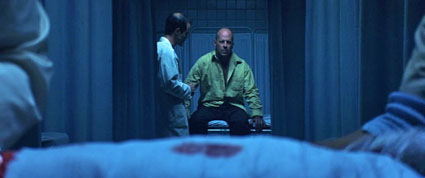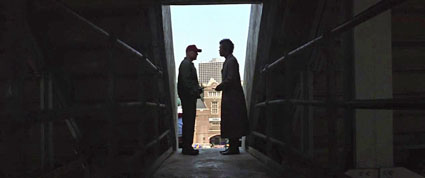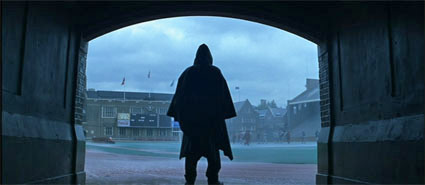 It seems to be an unwritten rule that every superhero origin movie should have a scene in which the main character excitedly experiments with his or her powers before fully donning the mantle of the titular hero.
It seems to be an unwritten rule that every superhero origin movie should have a scene in which the main character excitedly experiments with his or her powers before fully donning the mantle of the titular hero.
Consider the scene from “Spider-Man” in which Peter Parker scales walls and jumps from building to building joyously, or the one from “Iron Man” in which a reckless Tony Stark flies too far into the higher reaches of the atmosphere just to break that altitude record, or that scene from “Superman” in which the young Clark Kent races with a train.
Then consider the scene from “Unbreakable” in which David Dunn begins to realize that he can lift more weight than he should be able to. He is perplexed by the whole thing, but excited he is not. He seems almost suspicious of abilities and reluctant to try experimenting with them further. Later, his curiosity gets the better of him, but not his excitement.

This is the difference between M. Night Shyamalan‘s “Unbreakable” and other superhero films. Most superhero origin stories seem too eager to get to the powers and the joy and excitement of being a superhero. David Dunn, on the other hand, doesn’t want to have anything to do with extraordinary things like that. He wants to have a normal life like everybody else; one in which he doesn’t wake up feeling that quiet sadness, like he has for the past few years.
This reluctance of the main character to embrace his gifts is, among many other things, what makes “Unbreakable” such a unique superhero film. Sure, many films from the genre could claim to be more entertaining, but only a handful are as intriguing (the few titles that come to mind are “Superman,” “Spider-Man 2,” “Watchmen,” and Nolan’s Batman movies.)
David, played by a quiet, understated Bruce Willis, is a security guard and seems to be, for all intents and purposes, just an ordinary man, with ordinary problems. He hardly talks to his wife Audrey anymore (Robin Wright), and this troubles their son Joseph (Spencer Treat Clark). You sense that there is no love in their home in how quiet the few scenes with the three of them in the same room are.


And then a train derailment changes David’s life–not that he is hurt in the accident. On the contrary, he is the only survivor of the terrible disaster. Not only is he the only one miraculously left alive, there is also not a scratch on him. All this information is presented to us in a single, beautiful shot: David Dunn sitting up on a bed, a doctor standing next to him informing him of the situation, a dying patient under operation in the foreground. You do not see much, but you sense the gravity of the situation with the doctor’s tone of voice, Willis’s face, and, most of all, that bleeding, dying person, out of focus, way in the foreground. You don’t see a single corpse, but you sense the death hanging around the place.

The next shot is as brilliant. The camera pans across the hospital corridor as David walks through it, passing the loved ones of the accident victims. His son Joseph runs towards him and hugs him– and Audrey follows slowly, unsure of how to react to the fact that her husband just miraculously dodged death. The husband and wife look at each other with unsure eyes and then hug as well, but this hug looks more like a formality. Joseph joins his parents’ hands and then walks ahead of them. A few seconds later, they let go of each other’s hands, behind their son’s back.

It appears I’m getting carried away by the shots of the film. But such is the language of “Unbreakable;” it doesn’t say much in words but says a lot with its images, and I admire that. The shots are masterfully handled by M. Night Shyamalan and his cinematographer Eduardo Serra (who shot the last two Harry Potter films). The shots have that visual quality of the best comic books in that for effective storytelling takes place through visuals rather than through exposition. I will get back to the shots soon.
First, I must introduce the other main character, Elijah Price. Elijah struggles with a rare disease that causes his bones to break very easily (he is born with broken arms and legs, as the heart-rending minute long opening shot shows us). Because of his condition, the kids at his school call him “Mr Glass.” His mother, strong and supportive in the way that only a mother can be, encourages him to not be afraid and to get out of his room. She gives him comic books to occupy his time during his many hospital stays, to give him something to look forward to (she presents them to him as gifts every now and then), and, I think, to give him hope.


Elijah (played, as an adult, by Samuel Jackson) grows into a dealer of comic book rarities; his store is aptly titled “Limited Edition.” It is a sad thought that people will forever connect Jackson and superheroes with his role as Nick Fury in the Marvel films when his Elijah Price is a far more interesting comic book character. For starters, Elijah always has great lines to say, and Jackson delivers them with the same skill for monologue he so famously displayed in “Pulp Fiction.” Right from his opening scene, with his confident diction and his keen eyes, he makes Elijah seem formidable despite his physical condition.

Elijah takes comic books so seriously that when he learns that David Dunn was solely unharmed in the train wreck, he is convinced that David isn’t “just an ordinary man.” “If there is someone like me in the world, at one end of the spectrum, couldn’t there be someone else opposite of me at the other end?” he asks David. “Someone who doesn’t get sick or hurt like the rest of us? A person put here to protect the rest of us. To guard us?”
David outright refuses to listen to Elijah, but Elijah has seen too much and been through too much to let this go; he needs to know that David is a “hero” because, in some way, that justifies his condition. It feels like, to him at least, a more sensible plan than one in which he is simply randomly a weak person without a counterpart. And there is more to Elijah’s motivations than meets the eye.
“Unbreakable” follows David as he slowly accepts that there might be something extraordinary about his survival, and about how he has never been sick in his life. Slowly, as he gives in to Elijah’s unending prompting, he becomes what he was meant to be. I will say no more. The unraveling is wonderfully engaging, and I wouldn’t want to spoil it.


My haphazard description of the plot might sound either too simple or too complicated, and surely a little corny, but the film really isn’t really like that. This film transcends its genre in how it takes its time telling its story, and how, along with the progression of the main story, there are smaller subplots at work, in which the characters do not act as typical movie characters but react as real people would.
For instance, it is poignant and oddly beautiful how Audrey reacts to the train accident; one night, she knocks on her husband’s door (obviously, they don’t sleep together anymore) and tells him that his survival was a miracle, and that she feels like this is their marriage’s second chance. Robin Wright portrays Audrey as a strong woman, and even in scenes where she doesn’t seem to be in love with David, you can feel, somehow, that she still cares (I love how the women in Shyamalan’s films aren’t just women-in-a-thriller. They are strong characters, from “The Sixth Sense” to “The Village” to this film.)

It is also very interesting how Joseph reacts to the prospect of his father being a “superhero.” His reaction is not one you’d expect; yes, he is initially amazed and curious, as he should be, but as the film goes on, the those feelings give way to a strange desperation; he wants to know his father is not just an ordinary man.

This results in a very tense and beautifully acted scene in which David’s son holds a gun up to his father, wanting to shoot him and prove that the bullet will merely bounce off him, like Elijah implied. Bruce Willis’s lines in this scene are among my favorite pieces of Shyamalan’s writing. I discovered, while moseying around Shyamalan’s official website, that this scene is his favorite from the film, and I found it interesting that he didn’t pick one of the more obvious choices.

Another little touch I enjoyed was in Willis’s subtle performance: there is this feeling, in every word that he says, that David is hiding something; from himself, or from those around us in not very clear. We aren’t entirely sure what David is thinking, until, at a later point in the film, we learn of a repressed memory that adds a whole dimension to his relationship with his wife and his reluctance to accept his powers. And still, we aren’t fully certain what David is thinking. He is one of the most restrained, subdued heroes in a film of this kind.
And then there is that most interesting of themes, recurring in almost all superhero stories–duality. The duality between the mild mannered alter ego and the full blown super-persona, between good and evil, between the hero and the villain, between the strong and the weak. At the very core of “Unbreakable,” felt ever so slightly in every frame of the film, is this duality between Elijah and David. This duality is vivified at the very end of the film in what is widely accused of being a hackneyed twist ending. I think the “twist ending” simply gives some closure to Elijah’s story and motivations.
I find “Unbreakable” remarkable not just on the level of storytelling; its technicalities intrigue me as much. I said I would get back to talking about its shots, and so I will. Like most Shyamalan films, this film is shot very engrossingly. The shots are lengthy (and hence draw you into the events on screen), wonderfully planned out, interestingly framed, and show you a lot without drawing attention to themselves. Conversation isn’t handled in the traditional back-and-forth method of editing conversation; instead, Shyamalan either composes the shot with both characters in it at the same time, or he simply focuses on one of the two speakers.
I read that this film has just something like 400 shots in it. I imagine that a single action scene from one of today’s superhero films will have more than that number! That is not to say this film doesn’t have a cool comic book superhero scene; it does. There is the great train station sequence, which I cannot describe without spoiling for you. All I will say is that it is ingenious in how it shows the dilemma of a superhero–how does the hero chose who to bring to justice? Which cases are too trivial to take action?

There is another interesting device used by Shyamalan in his compositions for this film: the characters often seem framed by windows, doors, in TV reflections, etc., to emulate the panels of a comic book. I read that this was a deliberate decision of Shyamalan’s. Also, Elijah’s character is often seen in reflections on TVs, in mirrors, and picture frames. “They called me Mr. Glass.” See?




Do these ideas work? Do they add anything to the film, or are they just pretentious gimmicks? I suppose the matter is, like all art, subjective. But Shyamalan’s choices in the film really work for me.
Another aspect that greatly adds to effectiveness of “Unbreakable” is its score by frequent Shyamalan collaborator James Newton Howard, one of the apt composers working today. His score for the film stays somewhere in between being traditional hero music and being something from a more poignant drama, and it displays how the evolution of certain thematic identities in the music as the film progresses can give the film a sense of growth and, at the end of it all, some closure.
The collaboration between Howard and Shyamalan is, in my opinion, up there with the collaborations between John Williams and Steven Spielberg, and Danny Elfman and Tim Burton. These composers do their best work when working with these directors, and they are indeed the best composers for these filmmakers. Even if you dislike “The Village” and “Lady in the Water,” there is no denying that the music in these films is absolutely exceptional.
I don’t mean to say that “Unbreakable” is perfect. The film is in no hurry to tell its story, and that bothers some viewers. Also, there’s that twist at the end that people dislike. And, like most of Shyamalan’s films, “Unbreakable” is criticized for its implausibility. If you think about it, all his films are pretty ridiculous; remember the hydrophobic aliens in “Signs” trying to invade Earth, or the roles the tenants assume in “Lady in the Water,” or the basic premise of “The Village,” from the blind girl’s quest to find medicine to the village elders’ little secret? These films “fall apart when exposed to outside logic,” critics say.


But to that I ask, “Why expose them to outside logic?” These films are simply stories that Shyamalan is telling us, the same way that our parents make up bedtime stories for us. Why question the logic of the plot’s little details when the story, with its “implausibility,” might be addressing something more honest and more meaningful than all that? Yes, the world of the story or its logic might seem silly, but if you accept it the same way you’d accept a bedtime story, you’ll see how powerful the characters’ journeys are. “Signs” is not about the aliens, and “Lady in the Water” is not about those tree monkeys. It’s about these beautiful people going through these ridiculous events, and how they react to them. As long as the people’s reactions are true to who they are, I don’t see where implausibility really matters.
But I digress. Actually, I don’t. I’m not sure where I’m going with this. “Why this article, anyway?” you might be wondering. Well, I was looking at today’s superhero films, wondering where they’re going. Watching “The Avengers” twice can make you wonder about these things. These films are getting louder and bigger these days, and yet somehow they’re less ambitious where it counts. And I was thinking that we, or at least I, need a superhero film like this more often, just for a change.
Sure, watching Tony Stark kicking ass can be fun, but watching just an ordinary man discovering he isn’t quite ordinary can be much more interesting. But maybe that’s just me.











